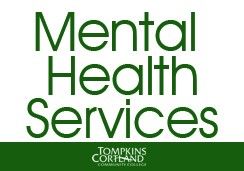Tompkins Cortland Expands Access to Mental Health Services

In response to a nationwide uptick in mental health and wellness needs among college students due to the impact of COVID-19, State University of New York Chancellor Jim Malatras has announced a comprehensive plan to expand access to mental health services to every student at SUNY’s 64 campuses, including Tompkins Cortland Community College.
As part of this new plan, SUNY is partnering with Thriving Campus to provide every student from SUNY’s colleges and universities with access to a network of more than 6,000 licensed mental health service providers. The mobile-friendly app breaks down a number of crucial, often overlooked barriers that students frequently encounter in the process of reaching out for help. By streamlining and simplifying what can be a stressful and overwhelming process, and building synergy with local mental health providers, more students will be seamlessly connected with the specific help they need, when they need it.
“For students everywhere, normal pressures associated with college are being compounded by the weight of this unprecedented time, with the challenges and disruptions caused by COVID-19 increasing levels of anxiety, stress, loneliness, and isolation,” said Chancellor Malatras. “With SUNY’s comprehensive Reach Out Mental Health Services Program, students across the entire SUNY system will have access to critical services.”
“During these challenging times, Tompkins Cortland will continue to meet our students’ mental health needs with in-person and tele-mental health counseling appointments,” said Matt Kiechle, Tompkins Cortland’s Interim Director of Health Services. “We are also excited to offer additional services made available by SUNY’s new and expanded mental health resources including the Crisis Text Line, increased community provider access via the Thriving Campus Application, and the Peer-to-Peer Assistance Hotline.”
The Crisis Text Line is a confidential text line available 24 hours a day, 7 days a week. Crisis counselors are committed and carefully trained volunteers from across the United States who support students experiencing feelings of isolation, stress, or suicidality. Crisis counselors use empathetic listening techniques with an emphasis on building rapport and trust, helping texters explore the issues, establish goals, and collaboratively problem-solve to come up with a plan for the texter to stay safe. To access the crisis text line, students simply text Got5U to 741-741.
The Peer-to-Peer Assistance Hotline established at the University at Albany will now be accessible system-wide. Students experiencing feelings such as loneliness, depression, anxiety, or uncertainty can call the hotline to connect with a trained student peer. Students do not need to be in crisis to use this hotline, which is a stigma-free, secure line for connecting about emotional, social, and other life issues. The phone lines are staffed by peers trained to assess students’ well-being and, if necessary, link them with the appropriate mental health services, academic or technological resources, or financial assistance available at their respective campuses.
These new initiatives are in addition to the Student Mental Health and Wellness Task Force, which SUNY established in October 2019 to make recommendations to the SUNY Board of Trustees on how the system can make a measurable difference in addressing the mental health needs of students and mitigating the negative effects of behavioral health risks, including suicide. The task force remains active, focusing on early interventions and exploring existing practices and public health approaches across the nation to address the mental health needs of SUNY students. The group is comprised of system administration staff, campus presidents, counseling center and student affairs staff, and faculty, as well as state and national mental health experts. Tompkins Cortland Associate Professor of Human Services Patty Tvaroha has been a member since it was formed in October 2019. “I was happy to be asked and to continue to serve on the SUNY Wide Mental Health and Wellness Task Force,” said Tvaroha. “I recognize the importance of developing an accessible, comprehensive way to meet the mental health needs of our students, and I’m glad SUNY is committed to the same.”
“This has been a particularly difficult time and it has taken a toll,” said Chancellor Malatras. “By expanding available student mental health support services—and shattering the stigma that may be associated with seeking them out—students will be able to get the support they need, be it a long-term treatment for a specific issue, or when they just feel down and need someone to connect with.”